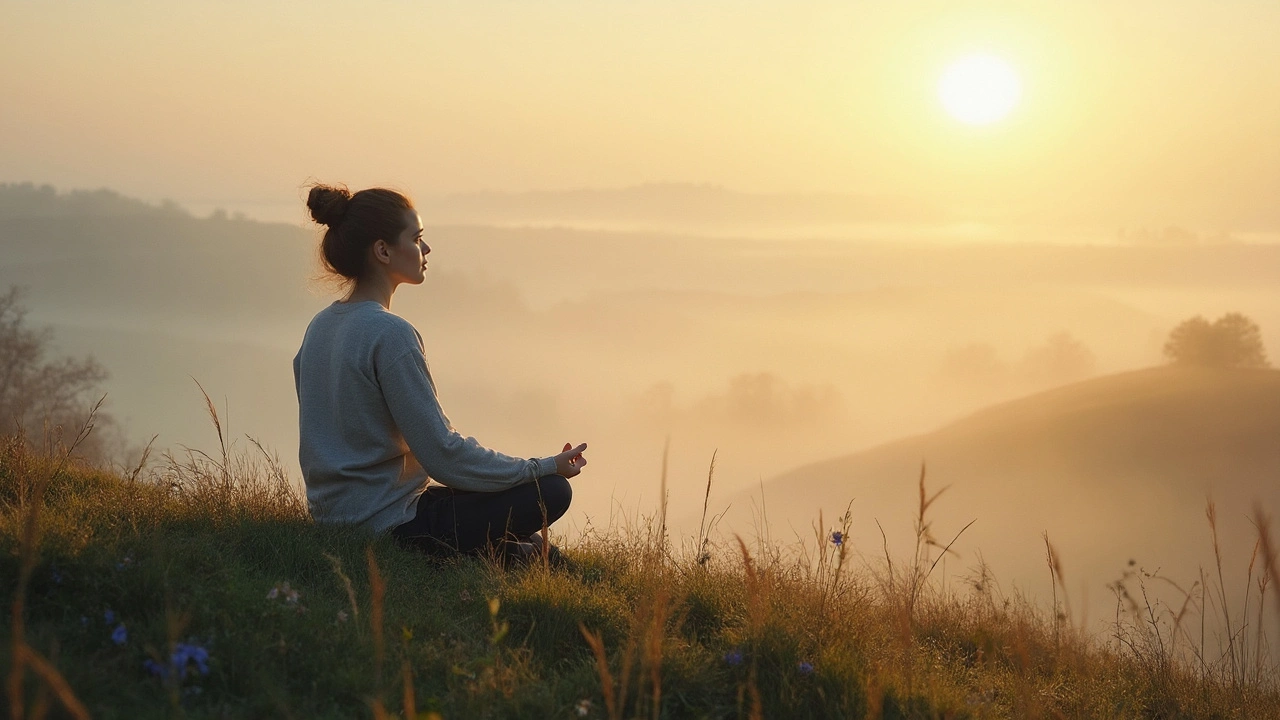Ever feel like life's moving at the speed of light, and you're stuck trying to catch up? You’re not alone. That's when mindfulness can become your secret weapon. Mindfulness isn’t just a buzzword; it's about living in the moment, fully engaged in now, without getting all tangled up in past regrets or future worries.
So, what's the deal with mindfulness? At its core, it’s all about paying attention, on purpose. You're not meditating to change who you are, but to become more aware of what’s happening right here and now. It’s a mental workout where your focus is the dumbbell.
Getting started doesn’t need to be complicated. Begin with a couple of minutes each day where you sit quietly, focus on your breath, and just notice your thoughts drifting by like clouds. You don't need lotus poses or to become a zen monk overnight. It's about making small steps, which means tuning in while you're brushing your teeth or savoring that morning coffee.
- What is Mindfulness?
- Benefits of Mindfulness
- Getting Started with Mindfulness
- Simple Mindfulness Exercises
- Incorporating Mindfulness into Daily Life
What is Mindfulness?
Alright, let's break it down. Mindfulness is about being present and fully engaged with the current moment without getting overly reactive or overwhelmed by what’s going on around us. It's kinda like stopping to smell the roses but for your mind. It’s about focusing on the here and now.
Mindfulness roots are deep, stretching back to ancient contemplative practices but don’t let that intimidate you. You don’t need to retreat to a mountaintop or chant in Sanskrit. Instead, it's more about being aware and attentive in your everyday life. Anyone can do it, and the best part? You’re already halfway there just by being curious enough to read about it!
Here's a cool fact: research from Harvard shows that our minds wander almost 47% of the time. This basically means we're only half present during our daily activities. Practicing mindfulness helps reduce this habit of living on autopilot. It trains our brain to pay attention and not zone out.
| Reason | Percentage |
|---|---|
| Mind Wandering | 47% |
| Mindfulness Practice | Focus Boost |
Another advantage? With mindfulness, we foster better emotional responses. It’s like having a personal pause button, giving you time to reflect before reacting. This is handy in reducing stress and boosting mental well-being.
In short, mindfulness isn’t about stopping your thoughts or emptying your mind. It’s about observing them without letting them run the show. So, you’re the observer, not the reactor. Curious to see how this could work in your life? Stick around as we dive into the benefits and some simple ways to get started.
Benefits of Mindfulness
So, why should you bother with mindfulness? Turns out, there are some pretty awesome perks. It's not just about feeling all zen and peaceful; there are real, tangible benefits that can improve your life in surprising ways.
First up, mental health. Studies have shown that regular mindfulness practice can reduce symptoms of anxiety and depression. By focusing on the present, you spend less time dwelling on negatives from the past or stressing about future what-ifs. It's like giving your mind a break from the negative noise.
Next, it's a win for your physical health too. Mindfulness can lower blood pressure, improve sleep, and even boost your immune system. Some folks have reported feeling less pain and discomfort with regular practice. It’s like giving your body a gentle reset.
Then there's focus. A lot of people find their concentration and decision-making skills get better. By training your mind to stay in the moment, multitasking becomes less of a juggling act and more of a focused flow.
Got stress? Mindfulness can kick that to the curb. It's been shown to decrease levels of cortisol, the stress hormone. Instead of feeling overwhelmed, you learn to pause and handle life's surprises with a bit more calm and clarity.
And let's not forget about relationships. Being present means you're more attuned to others, which can improve communication and understanding. It’s like becoming a better listener, but without the extra effort.
| Benefit | Impact |
|---|---|
| Mental Health | Reduces anxiety and depression |
| Physical Health | Lowers blood pressure and improves sleep |
| Concentration | Enhances focus and decision-making |
| Stress Reduction | Decreases cortisol levels |
| Relationships | Improves communication |
The bottom line? Mindfulness isn't just some trendy concept. It's practical, with benefits that really make a difference. Whether you're looking to improve your mental health, boost your physical health, or just find a little more peace amid the chaos, mindfulness has something to offer.

Getting Started with Mindfulness
Alright, so you're pumped to dive into mindfulness but have no clue where to begin. Don't sweat it. Think of it like trying on a new pair of shoes—you want something comfortable and practical first. Forget the idea that you need loads of time or a meditation retreat to get going. You can start right in your living room or even during your commute.
The trick is to commit to just a few minutes daily. Set a timer for five minutes. Yep, only five minutes. Sit in a comfy spot, close your eyes, and focus on your breathing. Inhale through your nose and exhale through your mouth. Simple as that. Your mind might wander, and that’s okay. Gently bring your attention back to your breath.
- Find Your Spot: Look for a clutter-free zone at home where you can relax without interruptions.
- Set a Regular Time: Make it part of your routine. Morning or evening times are often quieter.
- Focus on Your Breath: Notice how it feels as your chest rises and falls. If your mind races, just notice it and gently guide it back to breathing.
An easy way to incorporate mindfulness into your daily life is through routine activities. Whether you’re washing dishes or walking the dog, focus on what you’re doing. Feel the soap bubbles on your hands or the crunch of leaves underfoot. Tuning into these small experiences enriches your everyday life.
Many newbies find guided meditation apps helpful. With voices coaching you through each step, they can be a comforting guide as you learn the ropes. Give apps like Headspace or Calm a go to kickstart your journey.
| Platform | Free Version | Subscription Cost |
|---|---|---|
| Headspace | Basic | $12.99/month |
| Calm | Limited | $14.99/month |
Remember, mindfulness is a skill. The more you practice, the better you'll get. And who wouldn’t want some extra peace of mind? Don’t worry if it feels weird at first—you’re just warming up to a new way of living in the moment.
Simple Mindfulness Exercises
Ready to give mindfulness a shot? Here's the deal: it's less about sitting cross-legged for hours and more about squeezing moments of clarity into your busy day. Below are a few exercises to kickstart your mindfulness journey.
Breathing Exercise: Start with something super easy—breathing! Take five minutes each day where you find a comfortable spot, sit, and focus solely on your breath. Feel the air coming in and going out. Notice the rise and fall of your chest or belly. If your mind drifts, gently bring your focus back to your breath. This simple practice can really help you regain control when stress hits.
Body Scan: This is a great way to check in with your body and how it's feeling. Lie down or sit comfortably, and slowly focus your attention on each body part from your toes up to your head. Notice sensations like warmth, tension, or relaxation without trying to change them. It’s all about observing and acknowledging.
Mindful Eating: Pick a small piece of food, like a raisin or a square of chocolate. Instead of wolfing it down, take a moment to look at its texture, color, and shape. Smell it and eat it slowly, savoring each bite as if you’re experiencing this food for the first time. This not only helps you appreciate the food but can also curb overeating.
Walking Meditation: You don’t need a yoga mat for this one. Next time you're out for a stroll, pay attention to each step. Feel your feet touching the ground, notice the environment around you—the sound of birds, the rustle of leaves. Keep your mind on the sensation of walking and gently bring it back if it wanders.
These exercises are your stepping stones into the realm of mindfulness. Start small and add these moments into your day whenever you can. Consistency is key, and before you know it, you'll notice a shift, feeling more present and connected to your own life.

Incorporating Mindfulness into Daily Life
Minding the moment isn't just for sitting quietly with your thoughts or when you're meditating. You can actually sprinkle bits of mindfulness all over your daily routine, turning ordinary tasks into moments of calm and clarity. Here’s how.
One super easy way to get mindful is during your morning routine. When you brush your teeth or take a shower, really focus on the sensations. Feel the brush on your gums or the water hitting your skin. It’s a great way to start your day with a fresh mindset, tuned into now, not yesterday or tomorrow.
Another trick is practicing mindful eating. No, it doesn’t mean counting every calorie. It’s about truly tasting and enjoying your food. Take time to notice the textures and flavors, and put the phone away while you’re at it. You might find you actually savor your meals more, and maybe eat a bit less, too.
Same idea applies when commuting. Instead of mindlessly scrolling through your phone, try listening to the sounds around you, or focus on the rhythm of your breathing. Whether you're on a train or walking to work, it's a cool opportunity to practice mindfulness.
Even during a work meeting, you can pause for a second before speaking, giving thoughtful attention to your words. This can help with mental clarity and might make the meeting less of a hair-puller.
Now, here’s some food for thought: Research suggests that even a few minutes of daily meditation can cut down on stress by up to 28%! Imagine what regularly plugging mindfulness into small tasks could do.
- Start small: Just five minutes a day can make a difference.
- Be consistent: Weave it into your daily routine like you would brushing your teeth.
- Adapt it to fit you: Find what works best for your lifestyle.
- Be patient: It won’t be perfect, and that’s totally okay.
So be it your morning coffee, commute, or a meal, there are endless spots during the day to sneak in some presence. Over time, these moments add up, making you calmer and more centered. And who doesn’t need a bit more of that, right?
